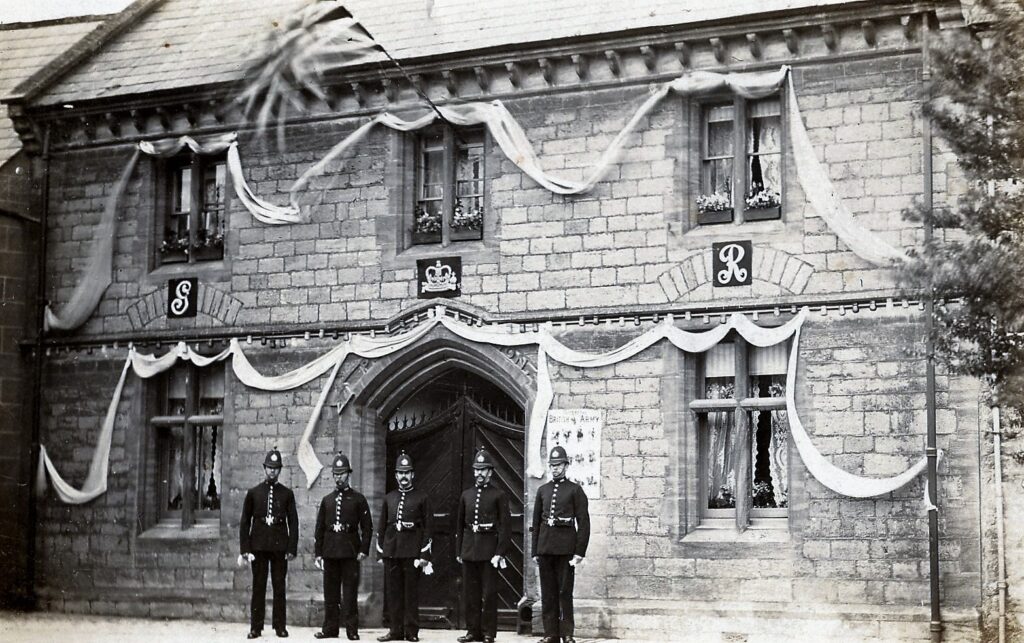THE GOOD, THE BAD AND THE UNFORTUNATE
OK, so there are those of you who maybe thinking that title sounds familiar. Clint EASTWOOD 1966, the trilogy that kept us glued to the screen, Lee VAN CLEEF as the bad and Eli WALLACH as the unfortunate (ugly).
This chapter is about officers that have passed, they are remembered by many as Force Characters or people who were great, or made mistakes, some horrendous or others that made their name from the problems they caused. Hopefully here are some short biographies of officers that fit the description because, either they were the best, the worst or just in the wrong place at the wrong time.
I am sure we can all come up with some names from our times: those that were excellent at the job, spent most of their time and energy and were purpose build for being upstanding citizens and were top cops. Then there is the opposite, those that embarrassed the Force by their lack of thought and actions. Lastly those that were doing a consciousness job, till fate stepped in and ended their careers.
Most of my information is either from the local newspapers. my grandfather, or relatives, but hopefully it is reported as the absolute truth, as I do not want to put anyone down just report the facts.
YOU MAKE UP YOUR MIND WHICH CATEGORY THEY FALL INTO.
+++++++++++++++++++++++++++++++++++++++++++++++++++++++++++++++++++
FRANK OLIVER DAY
Frank DAY was the tenth and last child born to Samuel and Maria DAY in Piddletown in July 1887. Unfortunately for the family just over a year later their father died and Maria was left to look after most of her children, although her widowed father had been living with them for several years. Frank’s grandfather suffered a similar fate as he lost his wife early on and ended up bringing his children up on his own before moving in with one of his sons and then his daughter Maria. The family were all brought up in a two roomed house in Front Street next to the old post office just off the village square.
Frank and his elder brother Edward were always polite and respectful when they met the local Constable, who lived on what was King Arms Street, in those days. Frank and his brother were always willing to work hard in the fields but soon decided they wanted to be village bobbies, like their friendly constable at Piddletown.
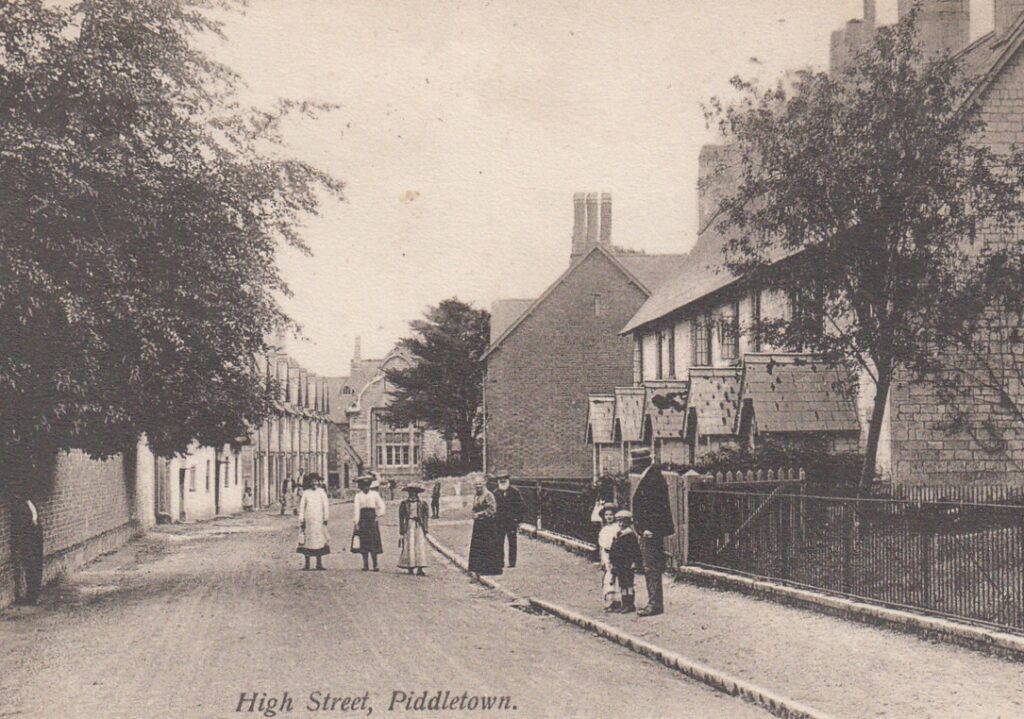
In 1907 both boys were put on the waiting list to join the Dorset County Constabulary and a year later they were both taken on. In June 1908 the Chief Constable decided it was about time the Force had its own detective, so Percy BECK moved to Dorchester and that meant his Constable number 22 could be filled by the next recruit which was Frank.
Frank and his brother both went to Dorchester where they both met up again with the Piddletown Constable who had been promoted three years earlier, to the training Sgt Major at HQ. Frank was issued his uniform and equipment and trained like his colleagues by revising the Constabulary black book. After three weeks marching and training Frank was posted to the newly built station at Portland and within the next two months his brother Edward was also employed as Constable 85 at Dorchester.
I have no doubt that Frank took part in the Constabulary Sports Day in 1908 and 1909, however I cannot find any records to confirm he took part until 1910 when he won two events. According to his grandson John DACOMBE he loved all sports and took part in every sport when the opportunity arose.
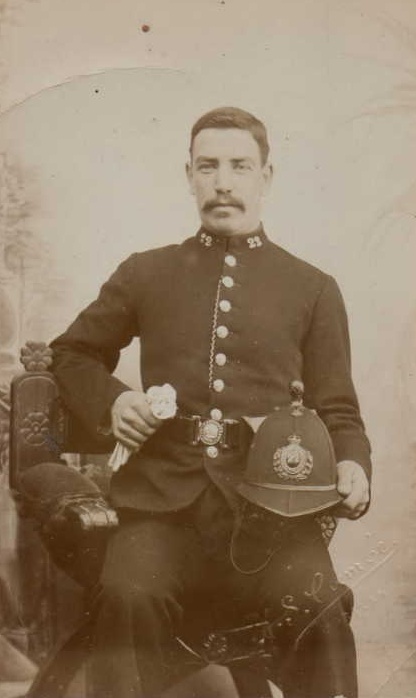
|
Frank was on the “Island ” of Portland for about two years and during that time he met his future wife who was a cook and housekeeper in Weymouth. Next he was posted to Bridport where he again lived in the single mans quarters in the station. Frank was a single man at Bridport, where he was one of only four constable under the local Sgt. I came across this photo on ebay which Frank sent home to Piddletown to one of his family friends.
Frank is 4th from the left. One of Frank’s favourite stories was one where he had to row out into the harbour and recover a body from the sea. Frank had much more to do at Bridport and got involved in many cases and in April 1912 was told he would be part of a contingent of officers that would be travelling to Radstock in Somerset to stop any disorder by the miners after the National Strike was called upon. On arrival at Dorchester HQ, Frank and another 24 constables were drilled by the new training officer Sgt William WHITE under the watchful eye of Sgt OSMENT and the Superintendent from Sherborne who just happened to be the friendly Constable he grew up with at Piddletown. |
| On arrival at Radstock they met up with the Somerset and Bath officers who with their horses had been there for a while. The Dorset contingent were there for back up for the local Forces and by all means there were no problems as the police understood the miners as they also felt they were underpaid for the hours they worked. Frank is in the back row in the centre was also becoming very popular as he would tell lots of jokes and not only entertain his own colleagues but also the miners. After a few weeks all the officers returned to their posts and not long after on 25th September Frank was married to Edith POLE after he had already been posted to the tiny beat of Oborne, again under the supervision of his once friendly Constable from Piddletown. |

By 1914 Frank was getting a reputation for his sense of humour and hard work and picked up the nickname “DOGGER” which would stick with him throughout his career. In mid 1914 a vacancy came up as an admin Constable in the Chief Constables office and Frank jumped at the chance to get to HQ. He was then working alongside all the important officers in the Force and worked under the admin Sgt, Alf BARRETT and no doubt helped out the detective Sgt, Percy BECK.
During the war years he assisted the Deputy Chief and Detective Sgt and started to gain the respect of all around him. He fitted in very well with all the staff as they were all good sportsmen, or loved sport and many of them played instruments and loved music. In 1915 Percy BECK was promoted and Sgt Harry LAWRENCE another excellent sports man and musician, took over as Detective SGT. By the end of the war many officers who should have retired much earlier were allowed too, and many changes and promotions took place. LAWRENCE was promoted to Supt and Frank filled the gap as Detective SGT.
In April 1921 Weymouth Borough Police Force amalgamated with the County Constabulary and the Chief Constable wanted to put his reliable men in command within the new Division of Weymouth and Portland. The Supt at Portland, William MILLER was moved to the Guildhall police station at Weymouth and Frank and another Sgt, Samuel Lovell were promoted to Inspectors, Frank taking over in charge of Portland and LOVELL being second in command at Weymouth. This would be Frank’s second time on the island but this time he had a wife and two children.
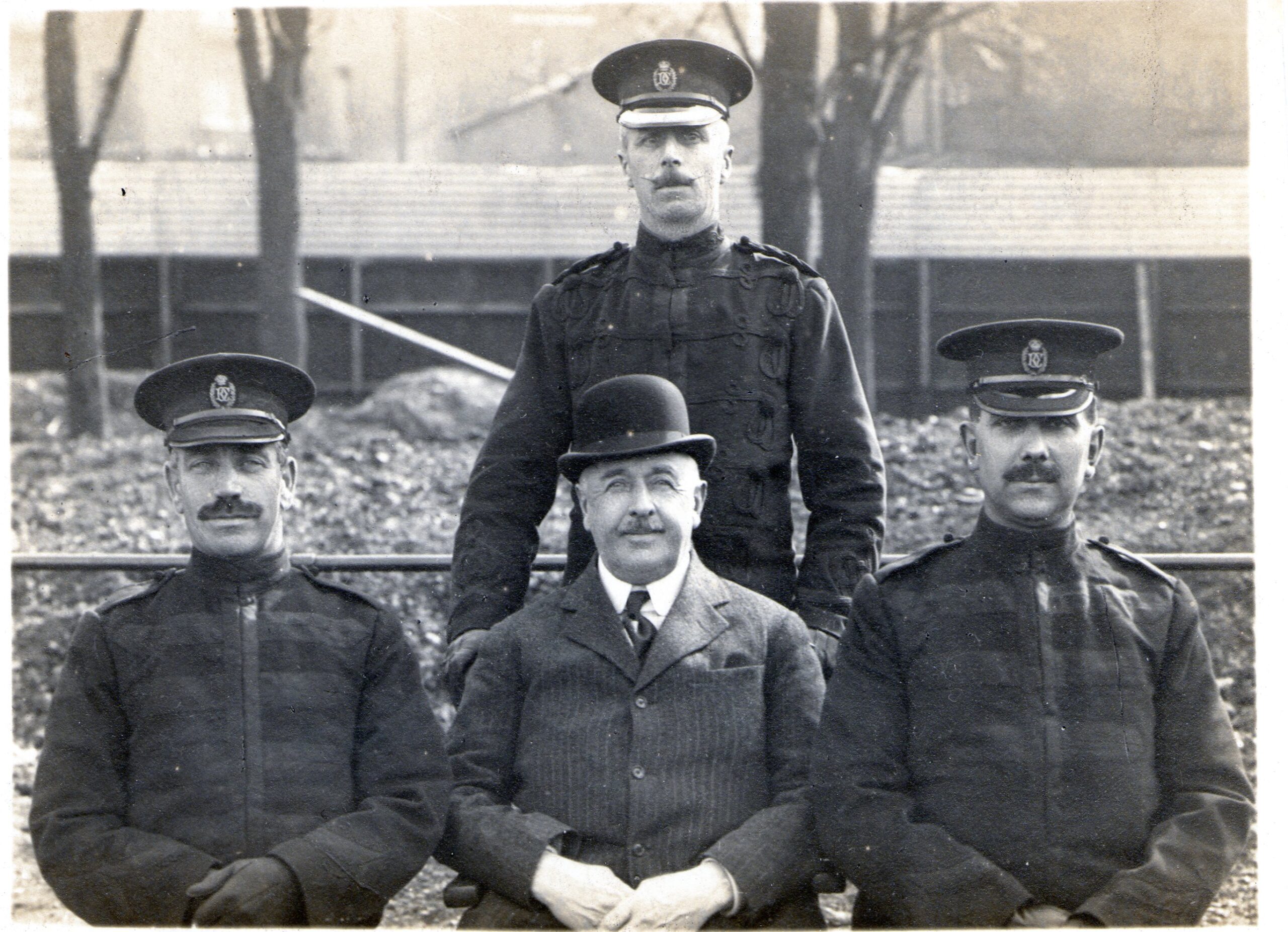
| Supt William MILLER at the rear. Frank , then the Chief and then Samuel LOVELL. |
Frank and his family moved into the police station on Castle Road and took charge of the men already stationed there under Supt MILLER. Reginald DRAKE was the Sgt, Charles CAILES and Arthur VARDY were the married constables and in the single man’s quarters were constable’s Tom ELLERY, George SAMWAYS, Clifford WALLER and Percy GRINTER.
In 1924 Frank and his wife have their third child, however baby Betty died within the same year and unfortunately is buried in “the stranger’s graveyard” near to the police station. The stranger’s graveyard is reserved for anyone not baptised or brought up on the island and mainly comprises of all that have perished in the seas after some many ship wrecks around the coast.
In the 1920’s, the senior officer in charge of a Division and to a lesser degree the sub divisional stations (which Portland was now classed as), were privileged to have the services of a “reserve man”. He was more akin to an officer’s batman in the Army, where he did some domestic services, such as keeping the whole station block tidy and also assisted in keeping the flower beds in order and the senior officers garden. Franks garden or rather allotment was very large and he would get some of the single men to help with the allotment in lieu of uniformed duty. On an afternoon in 1926 Frank asked single man David BLAKEMEN to do some digging on his allotment, not something that Dave was happy to do. The allotment was adjacent to the police station and in the centre of a large area of public allotment holders. Anyway Dave turned out in full uniform, with helmet and overcoat in full gaze of everyone commenced his digging. He was not the most skilful of gardeners at the best of times and his digging did not turn out to be very tidy and even in its finishing. Frank on witnessing his digging and uniform dress quickly withdrew Dave’s services and when back in the station informed Dave that he would be moving stations immediately. It turned out to be a good move for Dave as he got a posting to Weymouth, although it did complicate his courting as he was going out with Charles CAILES daughter at the time. Dave went on to be a Supt and Divisional commander in later years but without the aid of a reserve man.
Frank loved his sport and when he stopped playing football and cricket he was still involved as a coach or by managing the Divisional teams. The below photo has no date on it but is believed to be from 1928 or 1929 and shows the Weymouth Divisional football team. Frank is first left.

Frank ruled Portland for 6 years until he was promoted again and was posted to Wareham as Supt.
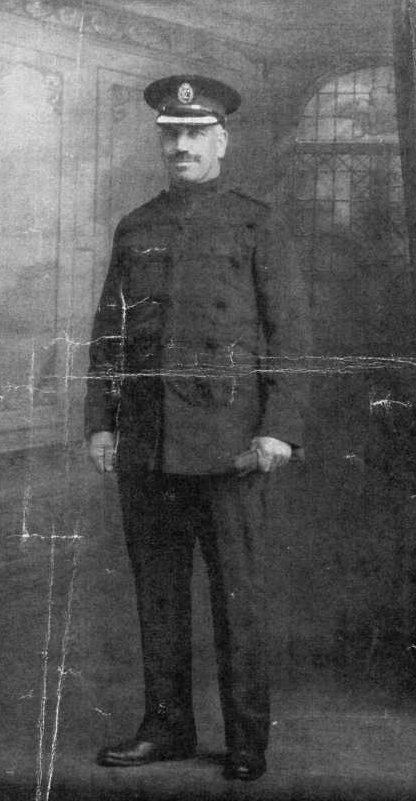
|
In March 1931 Frank was moved to Wimborne where he would stay until he retired in October 1934. Frank carried on his public service as he then joined the Council as a Supt of the Urban Council. In April 1949 he was elected to be leader of the County Council. All this time he still had a passion for sport and especially bowls.
|
+++++++++++++++++++++++++++++++++++++++++++++++++++++++++++++++++++
PC DIED ON CHARMOUTH HILL
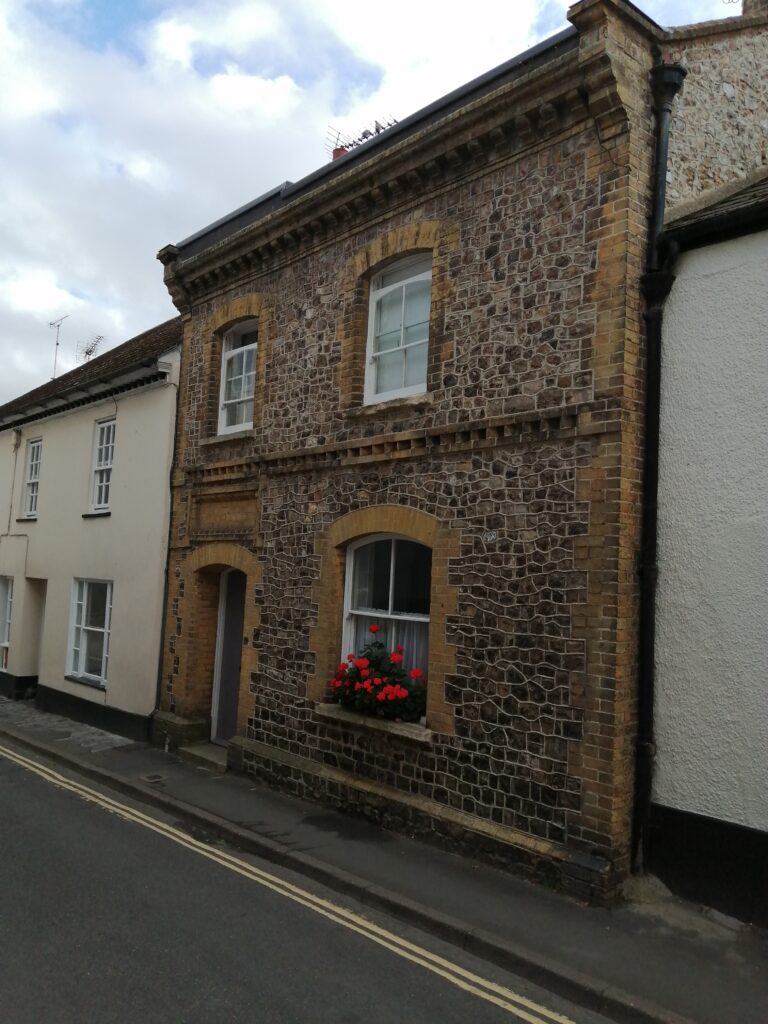
The original Lyme Regis police station.
On Sunday evening, 26th April 1908, PC Sidney George WOOD was on patrol on his bicycle, where he was stationed at Lyme Regis. The papers reported that the real cause of the policeman’s death will never be really known.
Unfortunately, PC WOOD passed away without regaining consciousness because of his terrible injuries.
From the enquiry afterwards, it was established that PC WOOD was cycling from Lyme Regis to Charmouth in pursuit of a man who, allegedly, stole a sovereign, and all the local officers were scouring the area for the thief.
At the point in the road known as “the cutting”, PC WOOD either lost control of his bike or the brakes failed. The cutting was part of the old roman road that went across the cliffs and through fields before it was a golf course, and the cliffs slumped, now the road at the Charmouth end is not surprisingly enough known as Old Lyme Road.
Below is the location in present times, which shows the downward gradient in the road, but like all photographs it really is steeper than it looks.

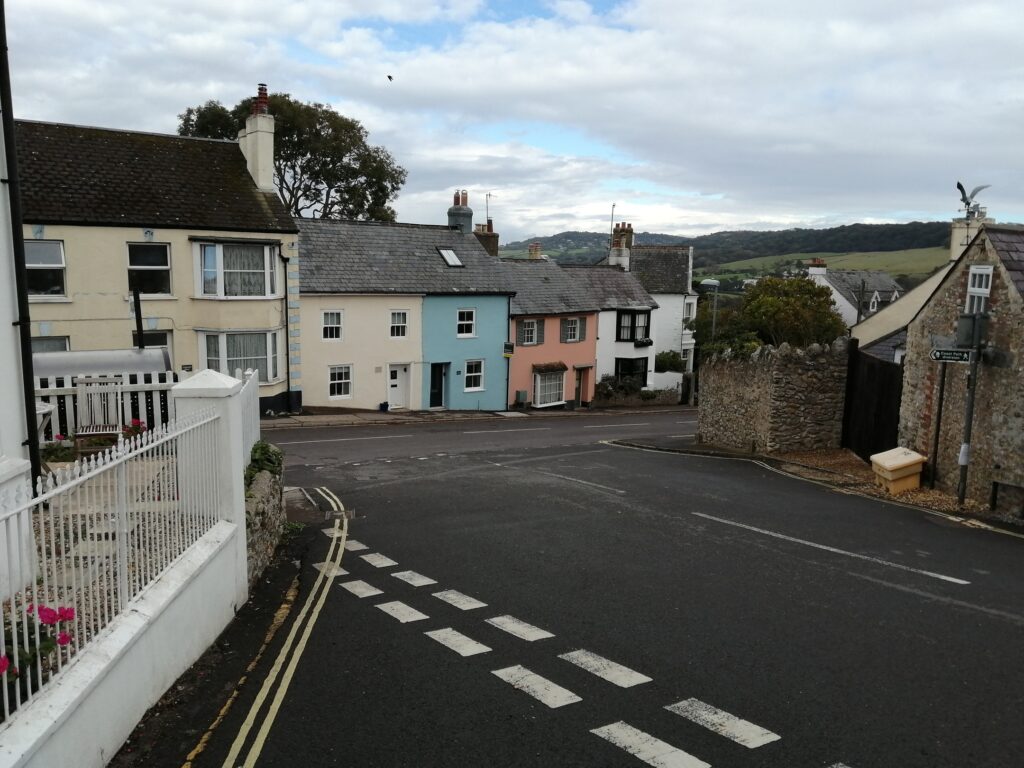
As a consequence, PC WOOD came down the hill at a terrific pace and failed to negotiate the corner, where the road meets the main street in Charmouth. He then collided with the doorway of a cottage opposite the junction on the main road, occupied by Mr Thomas BRADFORD. I believe the blue house in my photograph was the house involved.

The door of the cottage was open at the time and the only one in was Mr BRADFORDS’ 9 year old son Benjamin, who received a painful shock. PC WOOD collided with the doorway, then was thrown heavily into the passageway and received awful injuries to his head and the bike was completely wrecked.
When Drs INNES and BARRATT HINE arrived at the cottage, they found PC WOOD beyond help and he died within half an hour. On examining the door frame, it was established, that the bike had caught the door at the bottom, wrenched off the lower hinge and been flung up to the ceiling. The framework of the door bore imprints of the constable’s uniform buttons and it was said that his police helmet was thrown on to the roof of an adjoining house.
Police Sgt Frank BISHOP attended and his body was taken to Lyme Regis where an inquest would later take place. PC WOOD had only been at Lyme Regis since the 18th February after replacing PC Isaac CONWAY.
PC WOOD had only been married for about 5 months. He was described as of fine physique, about 27 years old and was a trustworthy and capable officer. The deceased, who was a native of East Coker, near Yeovil, had previously been stationed at Poole and Bridport and had 4 years service as PC 113.
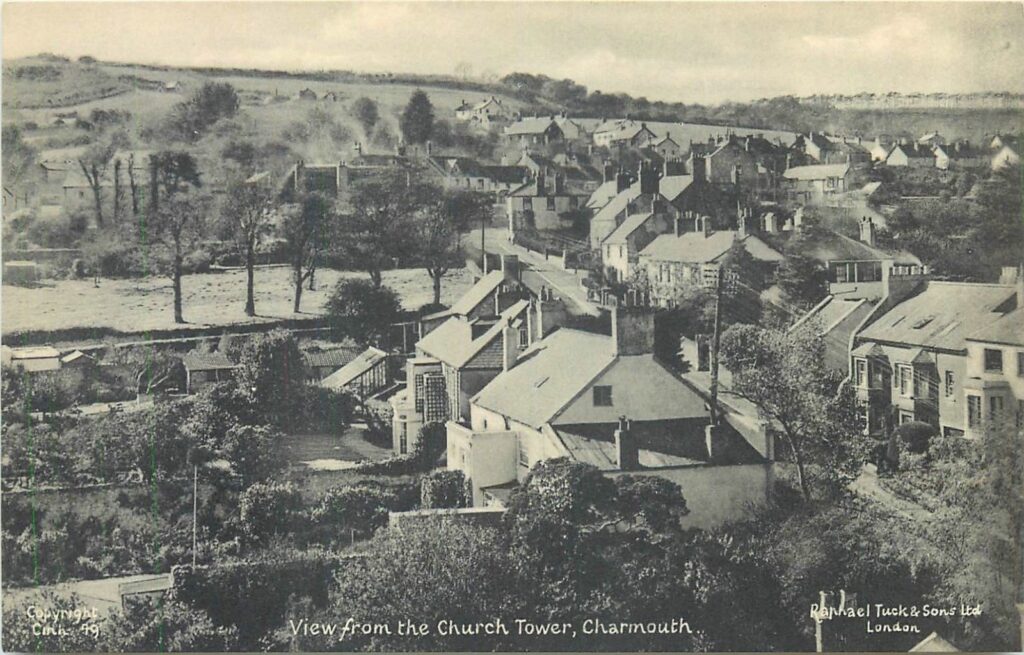
At the inquest carried out by coroner for West Dorset Mr CG NANTES, Sgt BISHOP gave evidence and reported that one of the bike brakes was out of order. The deceased had ordered a new one at a cycle agent’s, but it had not arrived before the accident.
The Deputy Chief Constable William PLUMMER said a grant was made to each constable of one pound a year, but the grant was only given after the machine had passed a test by the Chief Constable. There were periodic inspections of officers machines.
Frederick James HUTCHINGS, of Charmouth said the machine was beyond control and dashed with its rider into the doorway of Mr BRADFORD’s house.
Dr BARRATT HINE said that the officer was so badly injured that nothing could be done for him. The jury returned a verdict of “Accidental Death”. His body was taken to East Coker where on Thursday 7TH May his funeral and burial took place.
A large gathering attended including DCC PLUMMER, Supt Henry CARTER (Sherborne), Supt Solomon DENNETT, Sgt Major Arthur SWATRIDGE and 50 other officers in uniform. The elm coffin was covered in floral tributes: from the before mentioned senior officers and also, Sergeants, BEST, TOPP, OSMAN, HUSSEY and SPRACKLING and the constables from HQ and Dorchester Division. Floral tributes were also from Supt CARTER, Sgt BATTRICK, PC’s HARVEY, CHURCHILL, C PEARCE, BIDDLECOMBE, BARRETT, FORTH (?) and FUDGE of the Sherborne Division, and there were two more from the officers at Poole and Blandford.

The above helmet badge in my collection could have been worn by PC WOOD. The likelyhood of that is minimal, after where his helmet landed up.
Sidney George WOOD was married to Mabel Dora DODGE at East Coker parish church 2nd October 1907. They do not appear to have any children.
RIP Sidney.
++++++++++++++++++++++++++++++++++++++++++++++++++++++++++++++++++++
DORCHESTER MAY 1946
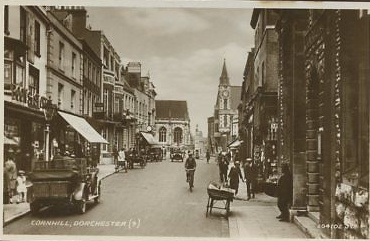
In May 1946 the Police Committee challenged the Chief Constable, Major Lionel PEEL-YATES about how he had dealt with an Inspector who had made a major mistake.
An inspector apparently had been driving the wrong way down South street in Dorchester. He had also been drinking (alcohol) which was obviously the reason why he had committed the misdemeanour. Was the inspector a local inspector and therefore certainly had too much to drink to contravene the one way system or was he from out of the area and not aware of the towns traffic regulations but anyway he had still been drinking.
The Chief Constable decided, it was up to him to take action, not the courts, and decided to bust him (demote) to Sgt.
The Inspectors name was kept out of the press and by checking records it should be easy to work out whom the inspector was, BUT at this point I cannot find a record of an Insp reverting to to a Sgt.
I believe there were 10 or 11 inspectors at the time, but I cannot find out which one it was !

Chief Constable PEEL-YATES, C/C from 1924 – 1955, 30 or 31 years Chief Constable.
An amazing fact but C/C Amyatt BROWN was also C/C for 30 or 31 years.
++++++++++++++++++++++++++++++++++++++++++++++++++++++++++++++++++++
PETER JOHN HOPER
Peter joined the Constabulary on 20th June 1954 at the age of 26.
PC 107 after completing his training was posted to Poole Central.
Joining the Constabulary was, for most, the start of a career, but Peter had already seen and done a lot .
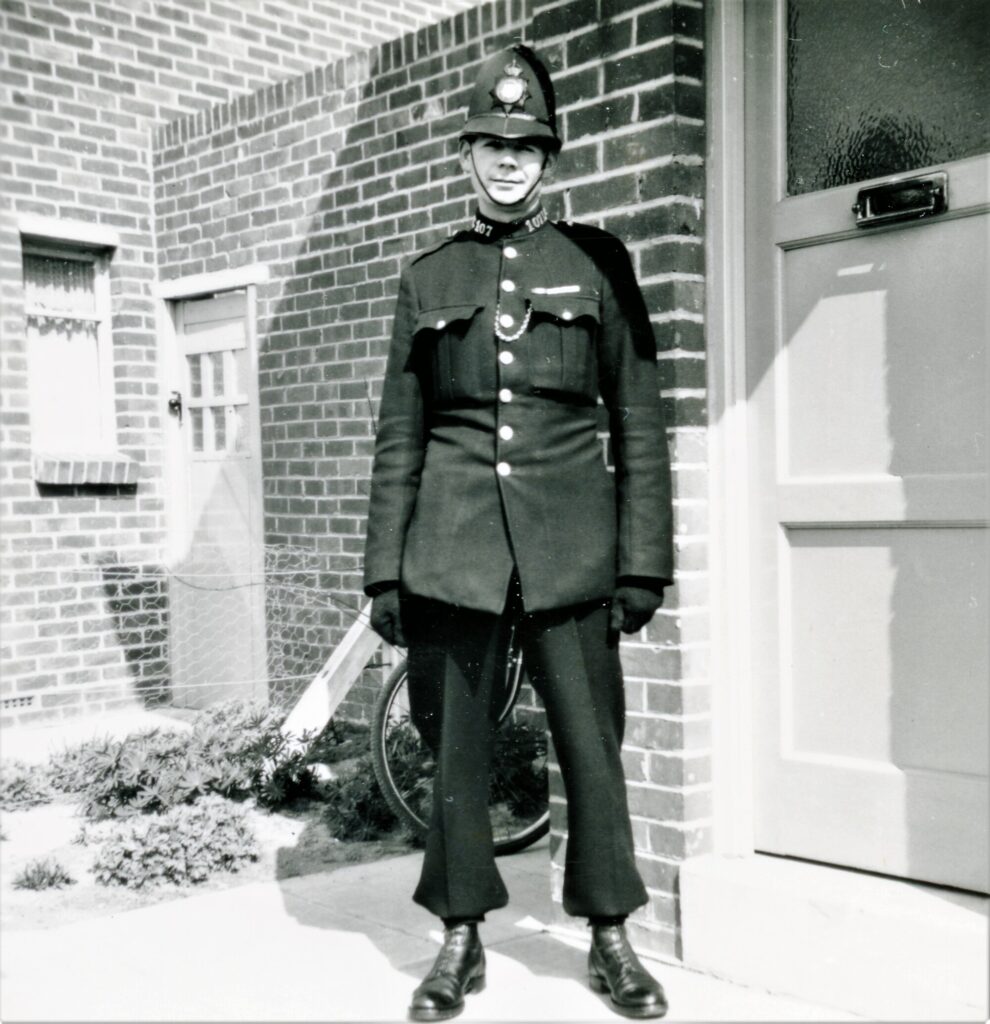
The above photograph was taken in 1955 whilst Peter and his family lived in a council house at 32 Kitchener Crescent, Waterloo Estate, Poole. I guess Peter has his bicycle clips on ! (Thanks to his son, Barry, for allowing me to use it, and much of the information below.)
Peter was born at Sevenoaks, Kent on 29th April 1927, but within a few years he and his family moved to Parkstone where he attended Heatherlands and Kemp Welch schools till finishing his education in July 1941. In September he joined the Bournemouth Gas and Water Company as a foundry moulder, but decided he could do better, so in February 1942 he became an office boy at W. E. Jones and son, a local business. Eight months later he again changed, this time getting employment as an operator at the Regal Cinema in Parkstone, where no doubt he saw many films on what was going on in other places around the globe, during the second world war. In May 1944 he joined the local Army Cadets and then enlisted on 29th October 1944 in the Commandos, although he did not see any active service.
After WW2 he carried on his army service with the Dorset Regiment and went as far afield as Singapore and Jamaica before requesting a transfer to the Gloucester’s, so he could fight with them in the Korean war. He was a sergeant machine gunner and took part in the Battle of the Imjin River during April 1951. The result of the battle left the ‘Glorious Glosters’ cut off from the larger allied force eventually leading their commander to instruct them to make their own way back to friendly forces. During this exodus, Peter was shot and ended up in a POW camps during which time he was mentioned in Dispatches for leading his men to resist Chinese attempts to indoctrinate them. During this time he was missing, presumed dead for 8 months.
I knew nothing about any of our British forces being sent to the Korean War so here is a little background. If you are not aware, the United Nations organisation was set up after WW2 to maintain peace and security. In June 1950 the organisation called upon all member countries to help the southern part of Korea repel invasion from the north. As a result the 29th Infantry Brigade were sent out to help, which included British men from the 1st Battalion of Glosters, 1st Fusiliers, 1st Ulster Rifles and 8th King’s Royal Irish Hussars. They arrived in Korea on 3rd November 1950 and 3 months later the UN forces launched a counter offensive assault with the help of 25 pounders from the Royal Artillery on Hill 327, south of the River Han, although 10 were killed and 29 wounded.
In early April, the 29th Brigade, supported by the 45th Regiment, Royal Artillery and under the command of the US 3rd division, took up scattered positions along a nine mile stretch on the south side of the Imjin river. The below photograph was taken before the battle, probably on Castle Hill (aka Hill 148).

Between the 22nd and 25th April 1951, the Brigade were still on the border at the Imjin river and were attacked from all sides by the Chinese. They held out for three days, even though outnumbered nearly 20 to 1, the Glosters being in the worse position along the front line, along with the Northumberland Fusiliers and a regiment of South Korean soldiers.
About two weeks later Peter’s family received this telegram, saying he was missing in action.

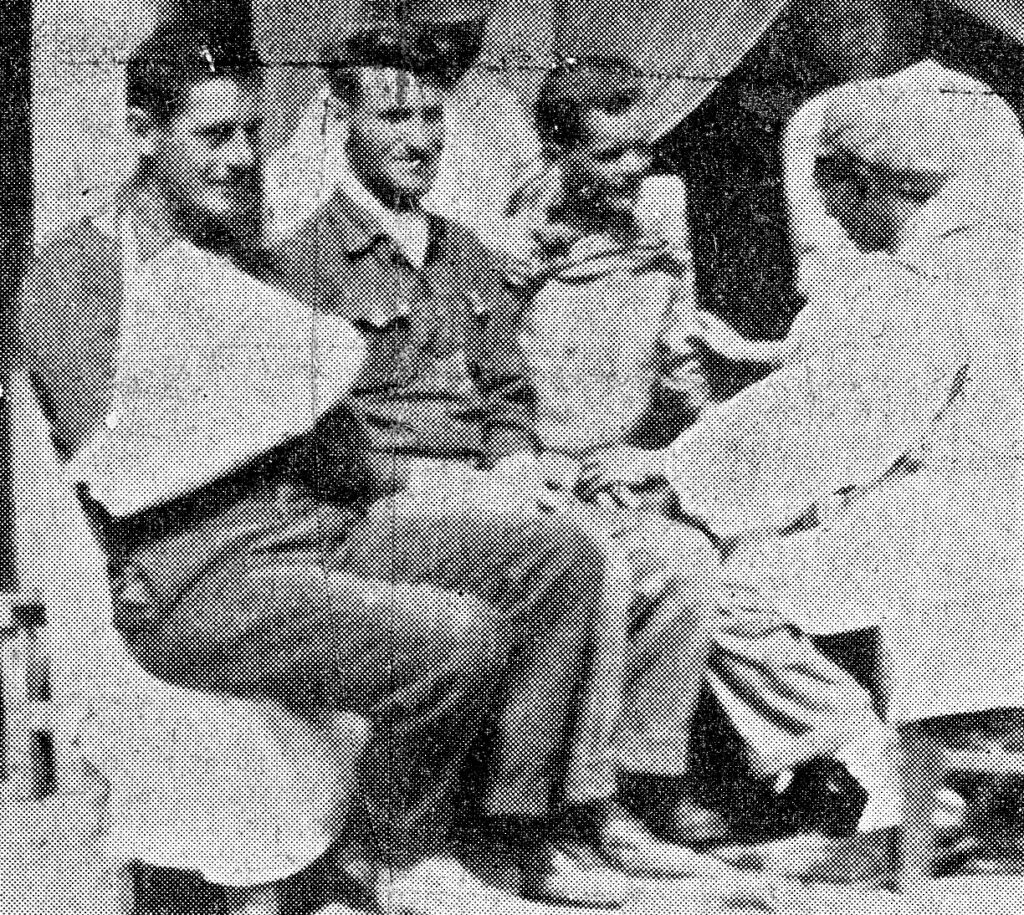
Peter was captured on the third day after being shot in the back of his thigh just below the buttock. He later said, he did not realise he had been shot at the time, he just felt a hard punch in his leg and later the Chinese military surgeon removed the bullet and presented it to him. Peter is third from the left of the wounded soldiers above.
Initially Peter and his colleagues were held in caves, before moving to No.4 camp at Weawan and later to camp No.5 at Pyocktong. He remained in captivity below at No.5 camp till released on 5th September 1953.
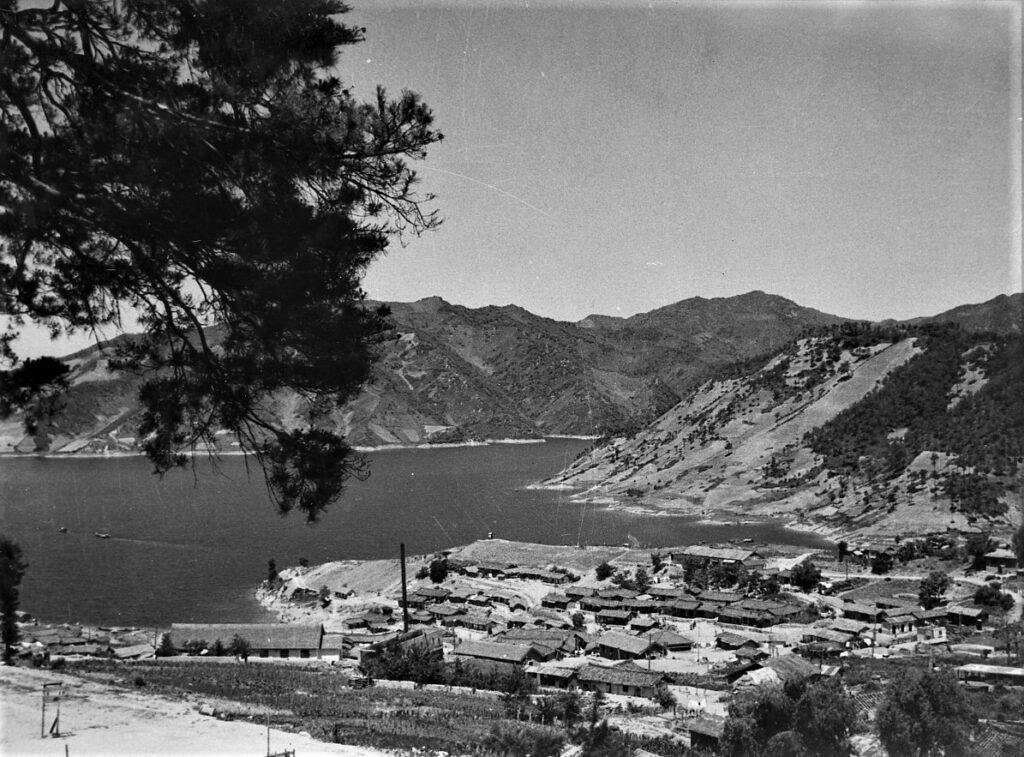
The battle of Imjin was described as “ the most outstanding example of unit bravery in modern war ” at that time. Over 1000 men were killed, wounded or missing. Within that figure 620 men were Glosters, 59 were killed in action, 180 were wounded, 522 were captured and were POW’s and 54 died in captivity.
Peter did not really mention the battle, although on occasions he gave away snippets of information like; the soldiers in his regiment took cover in the trenches when the Chinese war planes attacked but also when the USAF flew overhead. That his assistant on the machine gun was killed next to him, after shouting a warning about the enemy approaching. The Chinese would attack on the command of a whistle in waves, the second and third waves climbing over their dead colleagues to attack.
The below photograph was obviously taken in happier times, although still in captivity when Peter competed in and won a 5000 metres run race. Not bad for someone who had not long ago been shot in the leg. The bullet that was presented to him was a keep sake and brought home, he kept it all his life and after his death his wife got it gold plated, and now his grandson has it as a tribute to his heroic grandfather, although he is too young to have met Peter.
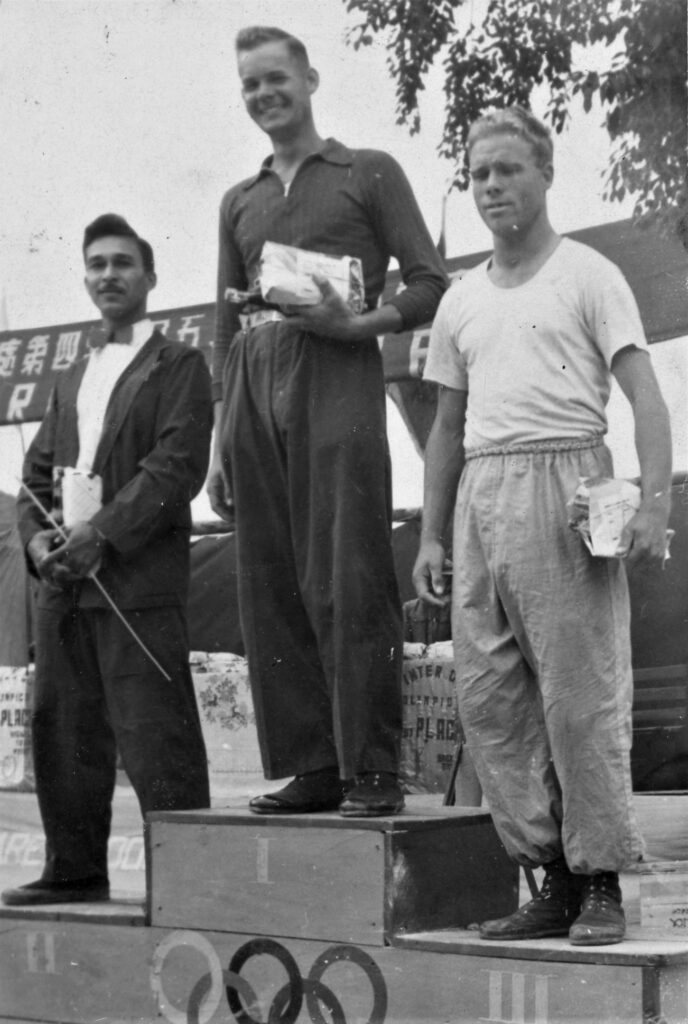
Below is a photo of young Peter when joining the Dorset’s and his medals from his Army and Police career.
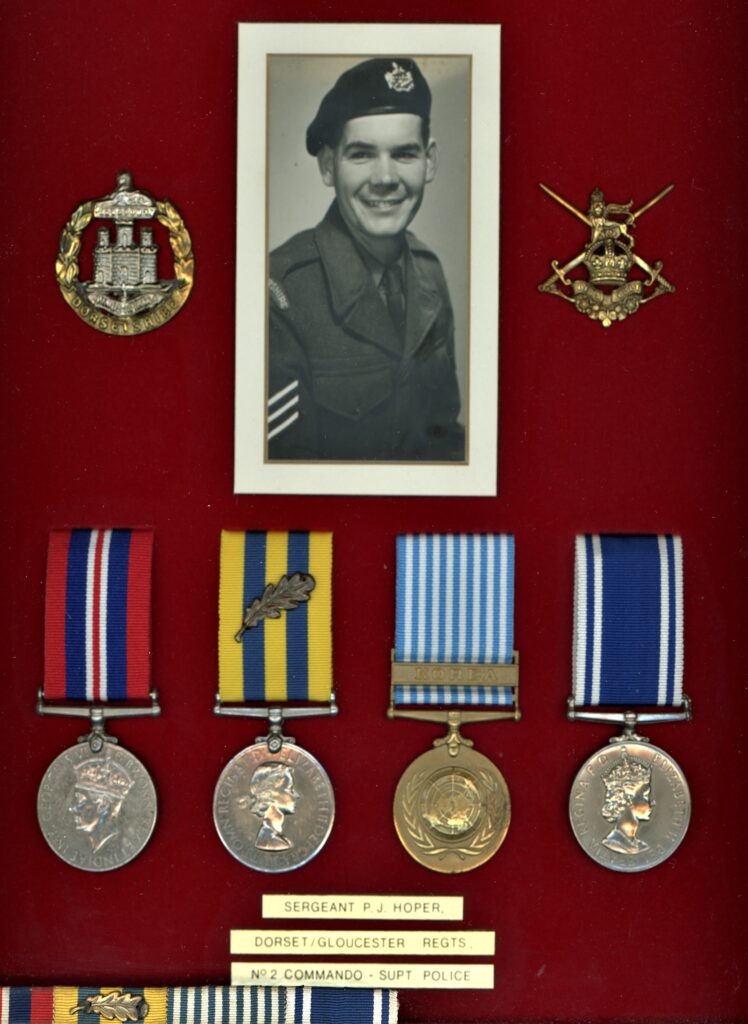
After returning from the far east in 1953, he decided to leave the Army and on 4th January 1954 he joined the War Department Police, now the MOD Police. Six months later he decided to move on and signed up for Dorset. Peter met my father when he first started at Poole, where my father was in the single men’s accommodation. Although my father had completed his two years National Service in Libya with the Pay Corps, he must have been in awe of Peter as they walked the beat together as probationers. It seems over the years of his service Peter kept up his running and fitness and took part in many police sports. He was probably the perfect policeman, if there is such a thing. Efficient, very knowledgeable of the law, an excellent leader who was an extremely likeable boss, who had total respect and therefore quickly progressed up the ranks, mainly in CID.
In November 1969, Peter was the Insp on the Regional Crime Squad at Bournemouth when a murder enquiry started. A twenty one year old called Diane KEMP had gone missing from Christchurch, six weeks earlier, which was being dealt with by the Hampshire Constabulary, as just within their jurisdiction. A member of the public had spotted a females body in some undergrowth in the countryside at Swanage. Her decaying body was identified within a few days and a murder enquiry commenced, with the knowledge she had also been raped. This became a joint operation with Hampshire Constabulary with enquiry rooms set up in both Forces.
The C/C of Dorset and Bournemouth Constabulary Arthur HAMBLEDON had great confidence in his detectives at the time and decided that they could deal with the incident rather than bring in well known detectives from the Met. Bud GREEN, had not long been promoted to Acting C/C and so Temporary Detective Ch/Supt was now Bill MAYO. Under Bill were D/Supts Bryan GIBBS for the East and Dennis BARRY at the West. D/Ch/Insp Ken POPLE from Poole and Peter were called in, like many other officers in the county.
After officers spoke to her parents, they found out that she would have been wearing a Pontiac watch and this could not be accounted for. Eventually when checking local pawn shops, PC John WELSH spotted a watch matching the description in a shop window on Ashley Road. WELSH took possession of the watch after interviewing the shop keeper and then handed the watch to D/Sgt KING who took it to her parents to identify it. Immediately they were sure it was her watch and also mentioned it had recently been repaired. Peter then took over and went to see the man who had repaired the watch, who again identified the watch as belonging to the KEMP’s as his initials were on it. MAYO now had a description of a suspect and shortly after the name Ian TROOP was put forward and also details of a car he used, a black Standard Ensign. Days later his landlady was interviewed who said he had left her residence and gone to London, leaving a forwarding address. On questioning her a bit more she said, he had a white Hillman car, although when pressed about it, she then stated he had a black Ensign before, which he had sold to another resident. Unfortunately the new owner and car could not be located so the following day Peter and Detective Eddie COOPER from Scenes of Crime were tasked to return. This time the new owner was in and immediately under Peter’s direction, COOPER searched the Ensign. Under the seat two buttons were located which were identical to those missing from Miss KEMP’s mini dress. There were also long strands of hair, which looked like they would also be a match. There had been some confusion over the suspects surname, but once the receipt for the Ensign was gained the signature was, Ian G TROUP. Further investigation with the Criminal records office showed he was recorded and already wanted for Indecent Exposure in London. The Met police were then asked to attend TROUP’s forwarding address, where not long after he was asked basic questions and arrested under caution. POPLE, HOPER and a young PC, Harry VINE were tasked to go and get TROUP from Peckham police station, but before their arrival they made sure they searched his lodgings and his white Hillman, where they found and bagged more incriminating evidence. POPLE arrested TROUP under caution and the three officers drove back to Bournemouth, and at that point he admitted to Peter that he had sold the watch and was further cautioned. TROUP’s only admission though, was that he had sold the watch and that he should have come forward earlier. The detectives then took TROUP to an interview room where soon after he was interrogated by the senior investigation officer, Bill MAYO. TROUP gave in easily to MAYO’s questions and admitted to raping Miss KEMP, but claimed her death by strangulation was accidental. POPLE then charged him and at Winchester Assize on 13th March 1970, TROUP was found guilty of murder and sentenced to life imprisonment.
Not long after the case Peter was promoted to Ch/I, now back to uniform and put in charge of Wareham Division, which was quickly followed by a return to Detective as D/Ch/I at Poole. Twelve months later he was promoted again to Supt and back to uniform, but still at Poole. He ended his police career as he had started it, at Poole Central, as he was the boss for Poole Division for nine years. During his time at Poole, because he was the senior officer and with his Army service, he had the pleasure of laying a wreath on the Poole park memorial on November 11th to remember all those who gave their lives for us in both world wars. Even though Peter had always been fit and loved running, Peter suffered a heart attack on 12th April 1980 and had no choice but to retire on grounds of ill health on 30th June 1980. Peter had four more years in retirement before dying on the 25th August 1984.
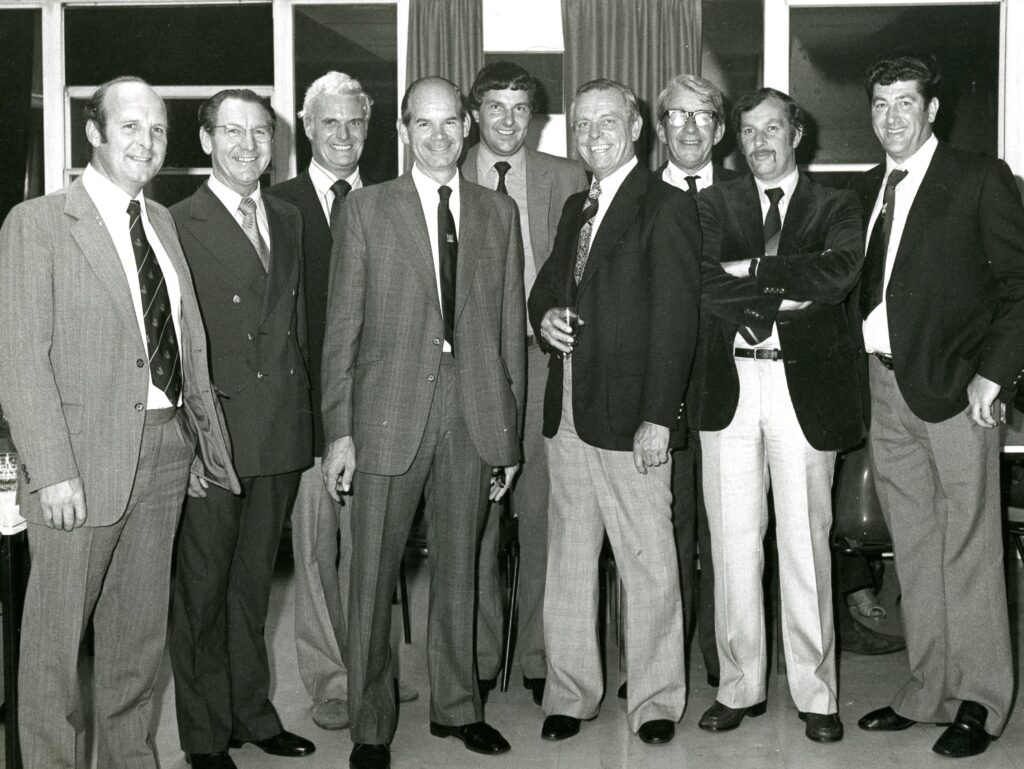
This photograph we believe is when Peter retired in 1980 : Left to Right :
D/C Duncan HARRISON, D/I Walter SQUIRES, D/I Ian COLLINGS, Peter HOPER, D/S Ian WIGHT, D/S Rex BOTTERILL , ? , D/C Jim FIGGINS, D/C Harry MOORE. ( 6 not known)
If you would like to read more about Peter, I suggest you read a chapters on the Diane KEMP murder in Allen Andrews book “ Intensive Inquiries”.
Peter is mentioned in ‘The Edge of the Sword’ by Anthony Farrar-Hockley and in the MOD ‘Treatment of British Prisoners of War in Korea by HMSO.
++++++++++++++++++++++++++++++++++++++++++++++++++++++++++++++++++++
DEATH AT LANGTON MATRAVERS
At the Dorset Standing Joint Committee meeting held on Saturday 13th February 1897 much was discussed. The alleged overcrowding of a steamer, pensions, fees to the Clerk of the Peace at Poole, the Judges lodgings at Dorchester and eventually the water supply at Langton.
Mr J E MOWLEM who represented the County Council asked that the question of the water supply to the Police Station at Langton Matravers should be looked into.
The Chief Constable stated that the County Surveyor informed him that the water was obtained from a public well in the road, and it was considered bad. It was, therefore, a matter for the sanitary authority of the District Council.
Sir Robert EDGCUMBE, also representing the County Council, pointed out that a great many people at Langton, carted their water from Swanage, and he thought the police should do the same. It was decided that the Clerk should complain to the District Council that there was not a proper water supply to Langton Matravers.
The crime stats for 1896 were then discussed, showing a 20 per cent increase in indictable offences, and a slight increase of non-indictable offences. 50 people were sent to trial at the Assizes compared to 36 in 1895.
Next on the agenda was the sudden death of PC 82 Edward WELSH.
The circumstances of his death were not discussed. The Chief Constable said PC WELSH of Langton Matravers had been in the Force for 14 months and was a promising and reliable officer. He recommended, in accordance with the Police Act, that a gratuity of 4 pounds and 13 shillings be granted to the widow of the deceased from the superannuation fund, being one month’s pay. All agreed.
Edward WELSH had been taken on in November 1895 after PC William DUBBIN had been reported for being under the influence of drink in the borough of Wareham at 2030 hours on 6th October, and being absent from his station the following day between 0900 – 2100 hours. After being suspended from duty for a month PC DUBBIN was interviewed by the Chief Constable on 2nd November. PC DUBBIN admitted his mistake, but this was the fifth time it had happened so he was allowed to resign.
At the beginning of December 1895, from General Orders, various changes of station took place. PC 75 Benjamin BARRETT was moved from Langton Matravers to Sherborne and he was replaced by PC 82 WELSH from HQ.
PC WELSH is next mentioned in General Orders in December 1896, when he is commended by the Chief Constable for rendering first aid where a member of the public had a severe cut to the thumb on the 1st of the month.
In the next General Orders dated 23rd January 1897, the Chief Constable said, he regrets to notify the Force of the death of third class constable Edward J WELSH, which took place at Langton Matravers on the 11th.
Edward WELSH joined the Force on the 4th November 1895 and during his short service he proved himself to be a very industrious and reliable constable and won the respect of all respectable inhabitants of the district of which he served.
In consequence of his death, the usual sum of 3 shillings and 6 pence will be stopped from each Sgts and constables pay on pay day and it will be forwarded to HQ. As a result, the sum of 28 pounds, 3 shillings and sixpence, was duly paid to his widow, Mrs WELSH.
On the 17th April 1897 at the next meeting of the Dorset Standing Joint Committee. The Chief Constable submitted a report on the analysis of a sample of water taken from the well at Langton Matravers, on which there had been some doubt thrown, and from which the constable there drew his supply of drinking water. The report said it appeared that the water was good and safe for all dietetic purposes. He did not mention whether many of the locals still were getting their drinking water from Swanage.
I hen decided to do some research on Edward WELSH to find out more personal facts. Checking out his death on Births Marriages and Deaths, there was no record of him dying in the Wareham area. However, on a general search for the Wareham area for the first quarter of 1897, there were:
Edward Isaac WELCH 25 years old
William George WELCH 0 years old.
Edward Isaac WELCH was born in the Langport area of Somerset in the 3rd quarter of 1872. He married Hester Alice WILLEY in the same area on 6th June 1895 and was described as a labourer.
In the Chard and Ilminster newspaper on 9th May 1896 the following was reported.
Births. WELSH May 3rd, at Westport, Somerset. The wife of PC WELSH, late of Langton Matravers, a son. The name of the child was never mentioned in those days, just the sex of the baby, possibly also to give the happy couple time to name him or her.
There are records of a child called William George WELCH who was baptised at St James the less church, Hambridge in the Langport district of Somerset.
The child’s father is Edward Isaac WELCH whose job is Policeman and they live at Langton Matravers.
So not only the Constable died but also his baby son.
His wife Hester Alice married again 2 years later to a local mason in the Langport area. He was called Henry NORMAN and not long after they had a son William George NORMAN. Hester and her second son William George NORMAN both lived to be 80.
++++++++++++++++++++++++++++++++++++++++++++++++++++++++++++++++++++
SGT CLIFFORD WALLER 1947
AMAZING STORY AT SHERBORNE COURT.
This was part of the title of a newspaper report in the Western Gazette on the 14th November 1947.

WALLER of Kings Road, Sherborne, formerly stationed at Portland and Lyme Regis. Five charges were proceeded with, but it was stated that the accused had admitted other offences which, would be eventually taken in to consideration.
Three of the charges related to alleged offences at Sherborne, between Sept 16th 1946 and Sept 27th 1947. They were stealing a hand drill, pliers, spanner and paint brush, valued at £1 13 shillings the property of George Charles SPILLER of Long Street; a vice and miners lamp valued at £1 10 shillings the property of DC Engineering Company, South Street: and breaking and entering a store in Bidewell Terrace and stealing a wireless set and a lavatory seat, value 15 shillings, the property of William Francis SHEPHERD, Keepers Cottage.
The other two charges concerned Lyme Regis, the allegations being that between 15th December 1942 and September 16th 1946, he broke into and entered a store at Mill Green belonging to Robert Guy RADFORD, a local auctioneer and undertaker, and on one occasion stole a stamp magnifying glass and on a second occasion a gas lighter both items valued at £1 5 shillings.
Opening the case for the prosecution. Mr F H JAMES, stated that Sgt WALLER joined the Constabulary in 1919 and ten years later was posted to Portland, where in 1940 he was promoted to the rank of temporary Sgt. He had voluntarily confessed various offences there in respect of which the only evidence was his own admission. In 1942 he was transferred to Lyme Regis and whilst stationed there committed the store breaking offences which were before the Court and four or five other offences which he had admitted and which, it was understood would be taken into consideration at his trial if he were committed. In 1943 he was confirmed in the rank of Sergeant and in 1946 was sent to Sherborne, where he committed the offences with which he is charged.
Soon after his arrival at Sherborne Sgt WALLER began to show signs of nervous disorder and on Sept 6th last went on sick leave. Three weeks later he called at the Police station and saw Supt LOVELACE, and confessed to an offence of obtaining electricity by by passing the meter. The Supt advised him to return home and arranged to interview him the same afternoon. Supt LOVELACE in company with Det Supt Harry LOVELL went to the accused house and Sgt WALLER made a long statement.
In October he made a further statement relating to the two offences at Lyme Regis. None of the offences with which the accused was charged and none of the offences which he had admitted had been reported to the police. The first knowledge of them was when Sgt WALLER confessed to Supt LOVELACE.
Supt LOVELACE of Sherborne stated that Sgt WALLER was in a very distressed state when he called at the station and asked for a private interview, and it was some time before it was possible to get anything from him. He said, “ I have had no sleep for days. I have done an awful thing, taking electricity by bypassing the meter. I must tell you this because the lights have all gone wrong. I have had it for about 2 months. There was a noise in the meter and I disconnected it. I am very sorry to bring disgrace upon you, when you know everything you will be amazed. I think I must be a Kleptomaniac; it is impossible for me to leave electrical tools or equipment alone”.
Det Supt LOVELL from Dorchester, stated the he and Supt LOVELACE called at Sgt WALLER’s house on Sept 2th. The accused searched his house and outhouse and produced a number of articles, including a drill, pliers, vice and an old wireless set. He said, “ I will be as helpful as I can but it will be difficult to remember the things I have taken and the approximate dates”
A long statement was handed in as an exhibit, but only the portions read were those relating to the charges before the Court. The accused was alleged to have confessed that he entered the store in Bidewell Terrace after pulling aside a piece of linoleum which covered a window frame and took the old wireless set, that he stole various articles from Mr SPILLER’s shop and a vice and a lamp from D.C.Engineering. Co. premises which he reached by walking along the railway line and getting through a wire fence.
On the 29th September continued the Det Chief Supt, the accused produced further articles including a spanner and a lavatory seat. He said the spanner came from Spiller’s and the seat was taken from Bidewell Terrace. He had taken the seat because his at home was broken. He was sorry for what he had done, but he seemed to have a mania for picking up tools, some of them he had not seen since he took them home and others he had never used.
Mr G.N.PORTER who was appeared on behalf of the accused, said it was true that none of the articles had ever been reported missing and no enquiries were ever made until Sgt WALLER made his confession. He had no reason to suppose any suspicion had fallen upon him or enquiries were in hand. He appeared over anxious to do everything he possibly could do to bring things to light. He lived in a police house, and had he reported a broken lavatory seat a new one would have been provided. He seemed to have made no material gain from any of his actions. His character had always been excellent: he was regarded as a conscientious officer and all who knew him were surprised at what had occurred.
Articles produced were identified by Mr SPILLER, Mr SHEPHERD and William Francis BLAZE, director of the Engineering CO, as similar to what they had lost. In no case had the losses been reported.
Giving evidence in the two Lyme Regis charges, Supt LOVELACE said the accused told him that in 1942 he visited Radford’s stores and opened a pad lock on the door of the sales room with one of three keys which he had in his possession.
Police Sgt FUDGE stated that he visited Lyme Regis, taking with him the three keys produced by the accused. One of these keys opened the pad lock on the door of the sales room. Robert G RADFORD, identified a gas lighter and a magnifying glass as similar to articles stolen from his sales room several years ago.
Sgt WALLER sat throughout the hearing with his eyes downcast and appeared to take very little interest in the evidence which was given. When formally charged he said: “ I wish to admit all the charges”
He was committed for trial at Winchester Assizes in December and was allowed bail on his own recognisance of fifty pounds.
December 5th in Western Gazette Judge postpones decision on police officer
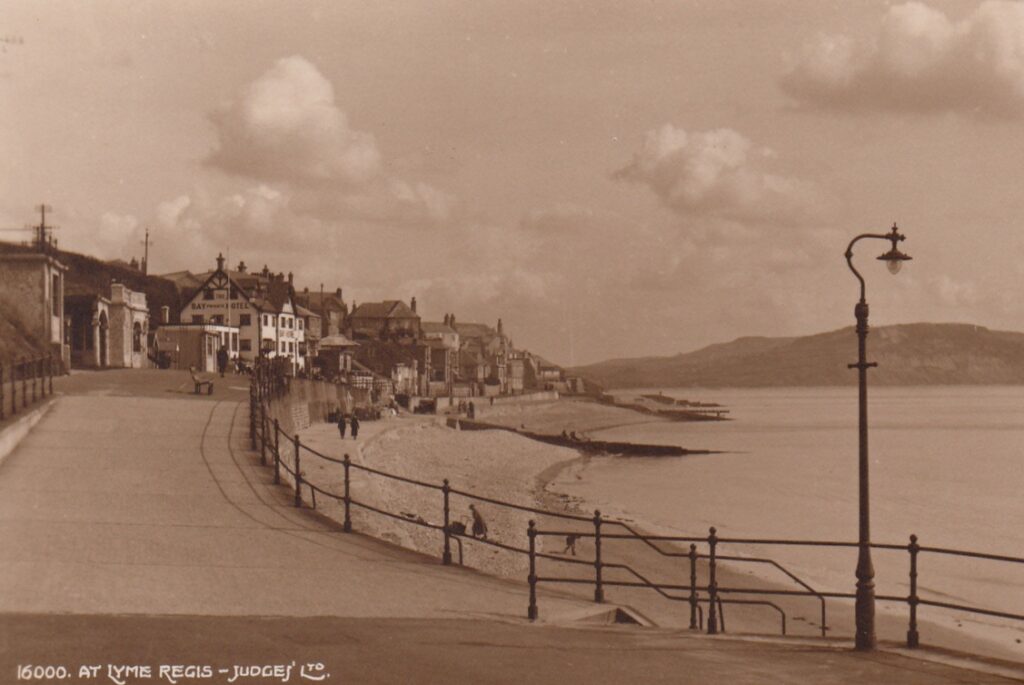
19th December 1947. Western Gazette reports:
DORSET POLICE SGT SENT TO GAOL
Former Police Sgt Clifford Oscar WALLER of Sherborne who had served for 28 years in the Dorset County Constabulary, on Tuesday left Hampshire Assizes at Winchester, to start a 6 month gaol sentence. He had pleaded guilty to store breaking and larceny and asked for 21 other cases for stealing to taken in to account.
WALLER was said by Mr E S FAY ( prosecuting) to have acted “rather like a magpie, collecting little things”, mostly electrical fittings and tools.
Mr Justice LEWIS, said that from a medical report it appeared that WALLER was in need of medical treatment.
++++++++++++++++++++++++++++++++++++++++++++++++++++++++++++++++++++
ERNEST RUSHEN
Ernie was born in the Christchurch area on 27th Jan 1914, he was the middle one of three boys. His eldest brother Charles was the first to join the Dorset County Constabulary in 1930 and Ernie decided that the he would join the Isle of Wight Force as he thought by joining a smaller Force he would have better prospects, than by joining Hampshire.
On 11th June 1933 Ernie joined the island Force as PC 54, even though there was always the threat that the island would be absorbed by Hampshire Constabulary. Ernie spent two years on the island before deciding he should transfer to Dorset Constabulary where he then became PC 65 and his next posting was Weymouth.
Ernie and his fiancée decided to get married and planned for the wedding on the 2nd September 1939 at Bournemouth however it was nearly cancelled. On the day before, on the Friday Germany invaded Poland but luckily it did not effect the weekend until the day after the ceremony when on Sunday, Britain declared war on Germany. Ernie and his bride Lillian had booked some time away for their honeymoon in the Lake District but never got there as all leave was cancelled.
During World War 2 the couple lived in Weymouth at 41 William Street, close to the sea, under the constant threat of invasion where the beach was covered in scaffolding to hopefully stop the enemy use it as a landing point.
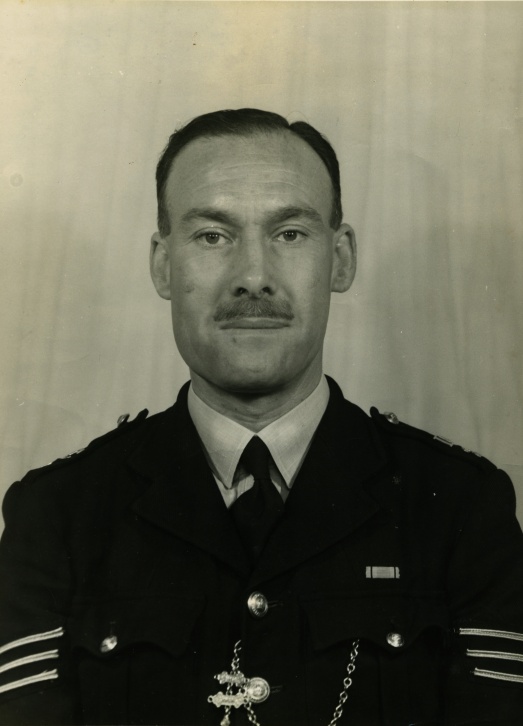
In August 1948 Ernie was promoted to Sgt, again he was two years behind his brother, but he was now at HQ in the Traffic department and in the right place for promotion.
Ernie was often in court giving evidence for numerous driving offences and in September 1952 was involved in a very high profile case due to the offender.
The honourable John Denzil Fox STRANGWAYS (JDFS) was the youngest son of local land owner, the Earl of Ilchester. Whilst on routine patrol with Sgt Harry MOORE. Ernie stopped a vehicle after they heard shouting coming from it. In the car was JDFS who was being driven by his man servant. Ernie was questioning the driver when JDFS approached him and assaulted him by grabbing hold of his arm and swinging him round.
In court, when the case was heard Ernie stated:
“He put his other arm over the top of my head, grabbed hold of my cap and pulled it off. He then got hold of my tie and pulled it tight.”
“I had a two inch bruise on my arm and the skin was gouged out of the back of my head, so I arrested him for being drunk and disorderly. JDFS resisted arrest and it took some considerable time to get him in the back of the police car.”
” I got in the car and whilst driving to the police station he grabbed my hair from behind and my head was pulled right back over the seat.”
He went on to say that JDFS was one of the most violent and abusive men he had ever come across.
When cross examined the defence solicitor tried to say that his client was just angry not drunk and that he also had bruises and injuries. JDFS was described as having a leg injury from the last war which meant he had a 60 percent disability pension and used a walking stick. His doctor, Dr RICKS gave evidence of his war injuries also mentioning that he suffered a head injury which made him susceptible to outbreaks of emotion, where he could be rather irrational and unpredictable. He went on to say that he had been his doctor for a good while and on two occasions had saved his life. He said he found it hard to believe he was drunk as on those occasions he was docile.
JDFS when questioned said “He had used strong language when being man handled into the police car. He believed the police knew his car and they had just pulled him over to annoy him ( He did not disclose why he had been stopped in the past).
He claimed RUSHEN had assaulted him when trying to get the handcuffs on and he was put on the floor in the back of the car. There was a further attempt by Sgt MOORE to get the handcuffs on but they failed to do so. He went on to say he had had a glass of sherry whilst on the train earlier and two shots of whisky at a hotel on arrival in Dorchester but he was not drunk. He had not pulled the officers hats off or assaulted them.
His man servant was also called to the stand and backed his boss, claiming that he was not abusive to the officers, JDFS was just using rather strong “old English”.
The Dorchester Magistrates concluded that JDFS was not drunk and disorderly and was not beaten up by the Police, however he was convicted of assault on Ernie and fined five pounds and four guineas costs.
Four more years past and by this time Ernie had been promoted and was now one of the two inspectors at Weymouth.
On 8TH May 1956, JDFS was on his own driving back to Abbotsbury along the coast road from Melplash via Bridport. When he got to Burton Bradstock he came across PC Geoff PEACH in uniform riding his pedal cycle down the main road. According to JDFS, PC PEACH was riding all over the road in a dangerous manner and as a result when he got past him he told him so.
JFDS then continued his journey and eventually his car was found outside the Ilchester Arms in Abbotsbury where he was arrested for not having proper control of his car under the influence of drink or drugs. JDFS was then conveyed to Weymouth Police station where he was brought before Sgt Albert MARSH and Insp Ernie RUSHEN. JDFS refused to see the Dr that was called to the station and would not answer any questions the Police put to him.
On Thursday 6th July 1956 the case was heard at the quarterly Crown Court sessions where after Sgt MARSH, Ernie again gave evidence.
He stated, ” whilst in the station, JDFS jumped out of his chair only to fall back in to it and raved at the doctor and was generally abusive to him”
When cross examined, Ernie agreed that he had said before on oath, that JFDS was drunk is Sept 1952 at Dorchester Petty Sessions, when he had been acquitted of being drunk although was convicted of assault on Police. He also went on when prompted to say that JDFS had had some run ins with his supervisor Supt Charles TAYLOR of Weymouth.
The defence solicitor then stated that his client gets stopped by Police officers on remarkably frequent occasions, “Was the inspector aware of that”?
He replied “No he was not aware”
“Did you know that even people who stop at his house get their cars stopped”?
Ernie replied “No”
“Is it fair to say there is something of a feud in this county between the Police and Mr Fox STRANGWAYS”?
“I don’t think so, certainly not from the police side”
“Would it be fair to say, that you are not personally fond of him”?
“No it would not be fair to say that”
“Are you fond of him”?
“I have no like, or dislike for him”!
Dr Frederick HUNTER said when he saw the accused at the Weymouth Police station he had no doubt that he was under the influence of drink or drugs and he could not have proper care of a car.
George SCOTT, the man servant of JDFS for the last eight years was then called to the box. SCOTT agreed that his employer was an emotional man who was very unpredictable. He could be called hysterical at times. He was not always in full control of his emotions and it could be very easy to rouse his temper. On that day the accused was rather distressed about the condition of his dog, who JDFS called “the pig”.
Dr RICKS, the accused personal doctor was then called again. He stated that SCOTT had phoned him to make him aware of his employers arrest. Dr RICKS was concerned as in cases before he had seen terrible bruises on him after being in Police custody.
RICKS was questioned: “Was your concern that the Police might beat him up, is that right”? His reply was, “Yes”
RICKS went on to clarify that he had seen his patient with terrible bruises when he was arrested in Bournemouth and he was black and blue from head to foot. In 1952 when he was arrested again his injuries were not quite so bad as just on his arms and thighs and he claimed the Police were responsible for his patient’s injuries. He continued that the Police had put him in the car upside down although he had not been there to witness it.
The accused JDFS was then brought to the stand.
“Have you on a number of occasions over the past few years experienced difficulties with members of the Dorset Constabulary”?
JDFS; “I certainly have” And he agreed that it started in 1952 with Sgt Ernie RUSHEN.
“Does your car ever get stopped by the Police”?
JDFS “It has been stopped on numerous occasions”
“For no particular reason”?
JDFS, “After various brushes with the Police, yes, once I was stopped on the Yeovil road and the Yeovil Suerintendent told me that they had had, a directive from the Dorset Police to stop my car whenever it was seen”
JDFS also went on to say that, on Garland Day in May 1954 the police had attended Abbotsbury and stopped the parade and taken away the pennies that the children had collected. He went on to claim that he had received a grovelling letter from the Chief Constable claiming it was nothing to do with the Police of Dorchester or Weymouth but the action had been taken by the local policeman on his own initiative.
When asked about his war injuries, he stated that because of a wound on his left leg, his left leg was shorter and he walked with a pronounced limp and being a heavy man tended to sway. On the day of the incident he had visited Melplash Court where he drank one glass of Gin and Ginger although most of it was accidently spilled down his coat. On returning home via “ the dangerous coast road”, he came up behind an officer on a pedal cycle who was weaving all over the road in a dangerous manner where it was hard to pass him. He said he believed if he saw something irresponsible, he was a man that would tell the truth and point out the fact even to anyone, so he told the policeman.
He then continued his journey till he stopped at the Bull Inn at Swyre where he had another Gin and Ginger. When he then driving through Abbotsbury. “the pig” had a spasm, so he stopped his car as he was emotional and bent over to hold the dog as he knew it was dying. When asked about being in custody he stated:
JDFS, “I was abusive to the Police because I was very angry”, I did not need to see a doctor, I am a man of temper and when I am shouting and hysterical I am accused of being intoxicated”
He was then questioned about the arrest at Bournemouth.
JDFS,“The police at Bournemouth met me at the railway station as I had had an argument with some railway people. They took me in to their yard and beat me up mercilessly. They knocked me down and when I got up they knocked me down again this happened about four times.
On that occasion he pleaded guilty to being drunk and disorderly and was fine one guinea.
JDFS believed the Police held a grudge against him and the fact that his jacket smelt of alcohol was what the case was based on rather than him being under the influence. JDFS was described as a war veteran that was a Lieutenant in the Coldstream Guards who had been wounded and taken prisoner in Egypt in 1941, who had relinquished his commission in 1944 as a result of his wounds. He now spent most of his time doing voluntary work for which he received no honours or payment.
Several other witnesses were called by the defence who had seen the accused at Swyre and Abbotsbury, all said he was not drunk , but some were Landlords.
In summing up his defence said, that JDFS was the squire of his village and somewhat eccentric, but it was not an offence to be eccentric. “It is not the defendant’s case, that in this case, the police have ganged up on him. It is not suggested that for one moment, that they have got together and concocted a lying story. We know perfectly well the Police do not do that sort of thing. I believe that the policemen have jumped to a conclusion that my client smelt strongly of alcohol because it was on his clothing not on his breath.
He was then asked about all his convictions, and he agreed that he had been convicted twice of careless driving in 1938 and 1951 where he had received fines of five and three pounds. He had also been fined twice for being drunk and disorderly in Bournemouth and London in 1949 and 1954 with further fines of a pound. At Abergavenny he had been fined a pound in for failing to conform to stop sign and for failing to produce insurance, as well as the five pounds for the assault on Sgt RUSHEN. In January 1955 he was fined for being abusive to a railway ticket collector.
JDFS was lucky not to go to jail due to his previous convictions and was fined fifty pounds, forty guineas cost and banned for Driving for five years. He died five years later.
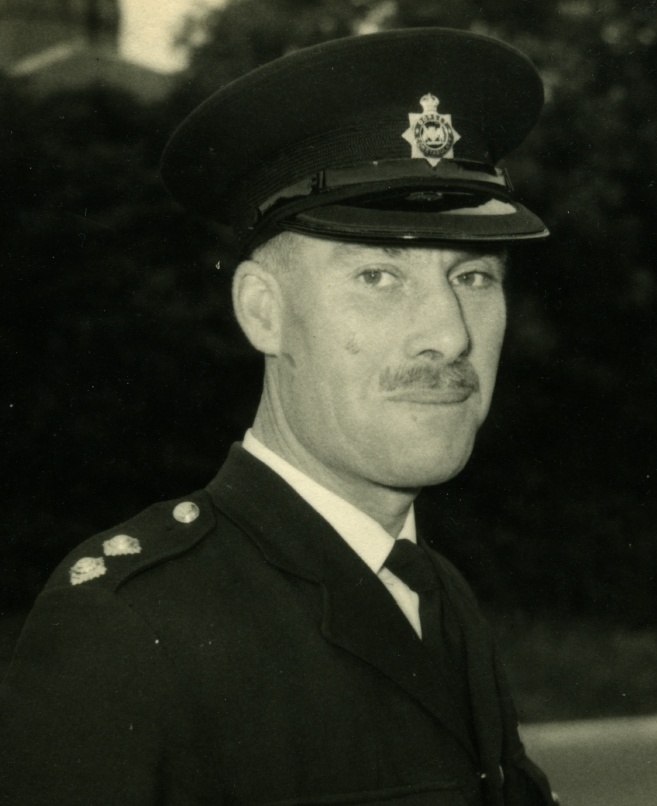
Ernie moved on from Weymouth to Poole in 1957 where he was promoted to Chief Inspector and then in Jan 1960 was made Superintendent in charge at Blandford where he stayed for three years. In 1963 he returned to Weymouth to take charge of that division. Before retirement in 1969 he was also in charge of the Dorchester sub division. Below is Ernie and his brother Charles when they are both Supt’s.
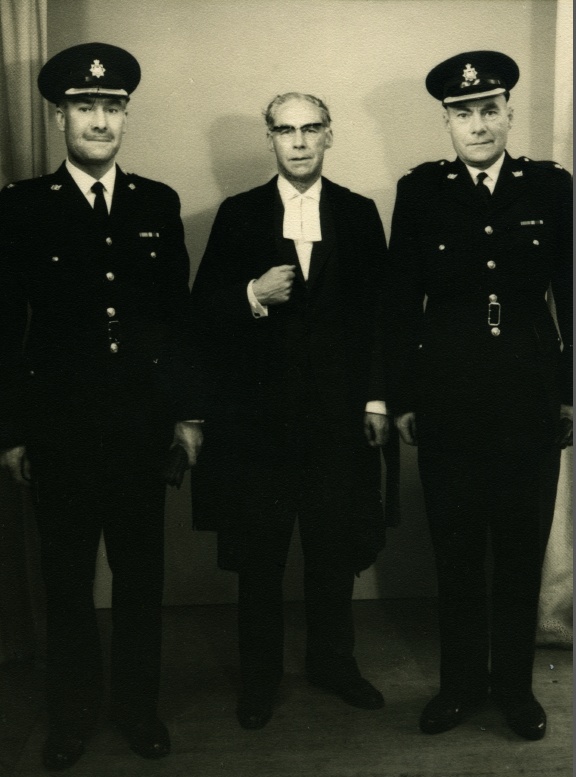
Many thanks to his son Ken RUSHEN for most of this information.
+++++++++++++++++++++++++++++++++++++++++++++++++++++++++++++++++++
POOLE POLICEMAN INJURED.
FALL FROM CAR THAT DID NOT STOP
Private John Richard HARDIMAN, a serving soldier at the A.F.V School, Bovington Camp, pleaded guilty at Poole police court on Monday to driving a car without a licence, not guilty to using an uninsured vehicle, and not guilty to failing to stop when signalled to do so by a police officer in uniform.
PC Stanley Ivor MARSH said that at 12.25 am on March 8th 1938, he was in the High Street, Poole, when he saw a car being driven at low speed and in a low gear and with the horn continually blowing. It turned in to New Street and returned towards High Street by way of Paradise Street. Thinking there was something wrong, witness stood under a street lamp, signalled with one hand, and held a lighted torch in the other hand.
As the car did not stop witness ran after it and jumped on the offside running board. “ I caught at the steering wheel” said the witness, “and as the car gained speed, I put my hand through the window. The driver knocked at my hand, but did not establish contact, I fell off and injured my right knee and right elbow. The driver was in khaki uniform with a peak cap, bit I could not identify him. I asked him what he was doing, but got no reply, and his head was turned away, so that I could not see his face.” Witness said he was still on the sick list as a result of his injuries.
Supt Joseph SWAIN added , that the witness was injured and there was no hope of him getting right. The witness confirmed since the incident his injuries had become worse.
PC Fred BRYER of WooL, said that he saw four men, including defendant at the Camp. Defendant stated that he went with other to Poole by car, which was driven by Fusilier McCOURTNEY. They all had some beer, and late in the evening they could not find McCOURTNEY. Defendant drove the car out of the Swan Inn yard and drove it to the Yacht Inn, in the endeavour to find McCOURTNEY. At no time did he see the Constable.
Defendant said he was in civilian clothes, he saw no Constable anywhere, and he was using the car by permission of the owners.
Lance Corporal SLATTERY, of the Welsh Fusiliers, said that when the defendant left with others by car for Poole on March 7th he was in civilian clothes, and when he returned on March 8th he was still in civilian clothes. “ They were dilapidated and he looked as if he had a rough night with something in general” said witness.
Fusilier Robert ROSS stated that he was with HARDIMAN on the night in question. Witness was part owner of the car, though the insurance certificate was in the name of Lance Corporal CLINTON, who was on holiday and could not attend. HARDIMAN had permission to use the car. He had too much to drink and slept in the rear of the car on the return journey. They had all been drinking all the evening.
Fusilier Robert McCOURTNEY also gave evidence, and said that he lost the rest of the party and cycled home on a borrowed bicycle.
The bench dismissed the summons alleging the use of an uninsured car, and they fined defendant 10 shillings for driving without a licence and 2 pounds for failing to stop.
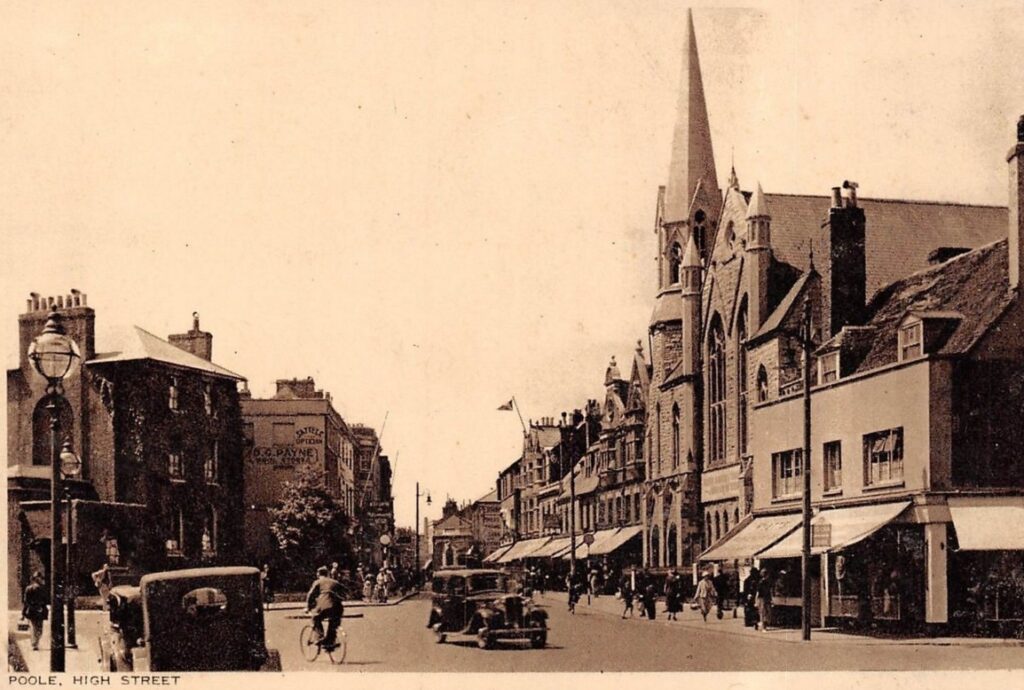
Taken from the Western Gazette from February 17th 1939.
IMPRESSIVE SCENE AT SYMONDSBURY
FUNERAL OF DORSET POLICE OFFICER
The death occurred in a London nursing home on Thursday, of Police Constable Stanley MARSH, who had been stationed at Poole, and who’s home was at Symondsbury. He had been ill for about a year, and his illness followed an incident in Poole when, in stopping a motor car late at night, he fell from the running board. He was the youngest of the three sons of Mr and Mrs E.A. MARSH of Manor Cottages, Symondsbury
Stanley MARSH joined the Dorset Constabulary in October 1934, and after being stationed at Dorchester for a short while, he served at Swanage and then in September 1937 he was moved to Poole. During his tragically short career in the Force he enjoyed the utmost popularity with his colleagues, and he showed outstanding ability in the performance of his duties. An elder brother PC Albert MARSH, is a motor patrols officer at Poole and another brother , Mr Alfred MARSH is on the Poole staff of the Hants and Dorset Motor Services Ltd.
An efficient and popular officer, he was also a keen sportsman. Before joining the Force, he was employed at the Brit Engineering Works, St Andrews Rd, Bridport.
As a tribute to his memory Symondsbury Church bells were rung half muffled on Sunday Evening.
Over 50 members of the Dorset Constabulary, in addition to the Chief Constable (Major Lionel PEEL-YATES) attended the funeral at Symondsbury on Monday. Six officers acted as bearers. PC’S COWLING, F POWELL, WOODSFORD and E POWELL (Poole) and APPLIN and HAINES (Wimborne).
The police mourners were: Superintendent Samuel LOVELL M.B.E of Dorchester Division, the senior County Superintendent, was in charge of the police, and there were present, Supts Tom L CARTER (Weymouth) and Fred W CARTER (Bridport).
Inspectors: George BURT (Wareham) and Percy LOVELACE (Dorchester).
Sergts: George DIMENT (Bridport), Charles TAYLOR (HQ), Cecil SWATRIDGE and Freddy DANN (Poole) and Tom CONWAY (Dorchester).
PC’S: MASTERS, HINDLEY, BROADWAY, HANN, HITCHMAN, JEANS, MORTON, MARGRIE, OLIVER, GENTLE and LUFF (Dorchester). HIBBS (HQ)
PC LOVELACE (Swanage)
PC’S: SARTIN, OSBORNE, GOODCHILD, CROSS, KNIGHT , MASSEY and Detective Constable Charles RUSHEN. (Bridport).
PC’S: CARTER, Ernest RUSHEN, Frank PAYNE, SMITH and Jack ASH (Weymouth).
WILLIAMS, STAPLES, TREVISS, SWATRIDGE, JEANES, PULLMAN, Frank NORRIS, MANUEL, REEVES, BARTLETT, LOADER, LAMBERT and DUNFORD. Police Woman COURT (Poole)
WEBB and BAKER (Wimborne).
The photograph below is very likely to be Stanley MARSH , although I cannot be certain. The age of the photograph and uniform is similar to that of around 1934. On the rear of the photograph written in pencil is ” Please return to Poole Office” which is another strong link to him.
Stanley was allocated the number 125 and kept the number during his 5 years service.
RIP. Stanley Ivor MARSH, October 1914 – 9 February 1939.
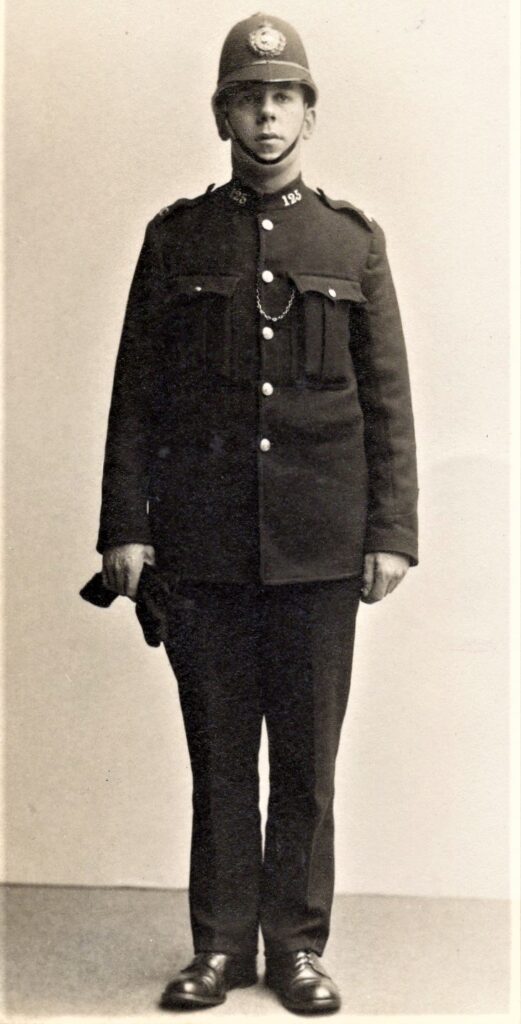
More Force Characters to be added later !
